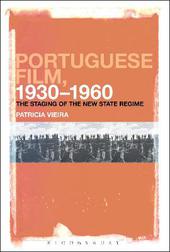
|
Portuguese Film, 1930-1960: The Staging of the New State Regime
Paperback / softback
Main Details
| Title |
Portuguese Film, 1930-1960: The Staging of the New State Regime
|
| Authors and Contributors |
By (author) Dr. Patricia Vieira
|
| Physical Properties |
| Format:Paperback / softback | | Pages:272 | | Dimensions(mm): Height 229,Width 152 |
|
| Category/Genre | Films and cinema |
|---|
| ISBN/Barcode |
9781501307287
|
| Classifications | Dewey:791.43094690904 |
|---|
| Audience | | Professional & Vocational | |
|---|
| Illustrations |
20
|
|
Publishing Details |
| Publisher |
Bloomsbury Publishing Plc
|
| Imprint |
Bloomsbury Academic USA
|
| Publication Date |
23 April 2015 |
| Publication Country |
United States
|
Description
Portuguese Film, 1930-1960: The Staging of the New State Regime provides groundbreaking analysis of Portuguese feature films produced in the first three decades of the New State (Estado Novo), a right-wing totalitarian regime that lasted between 1933 and 1974. These films, sponsored by the National Propaganda Institute (Secretariado Nacional de Propaganda), convey a conservative image of both mainland Portugal and the country's overseas African colonies (Angola, Mozambique, Cape Verde, Guinea-Bissau and St. Thomas and Principe). The films about the mainland emphasize traditional values, the importance of obedience to authorities and a strict division of gender roles, whereby women are relegated to the domestic sphere. The Portuguese countryside, where age-old customs and a strong social hierarchy prevailed, is presented in these movies as a model for the rest of the country. The films about the colonies, in turn, underline the benefits of the Portuguese presence in Africa and portray the colonized as docile subjects to Portuguese rule. The book includes chapter summaries in the introduction, in-depth analyses of the most important Portuguese films produced between 1930 and 1960, a discussion of the main topics of Portuguese cinema from the New State, and a comprehensive bibliography that guides students who wish to read further on a specific topic. First published in Portuguese to wide acclaim, Portuguese Film, 1930-1960: The Staging of the New State Regime fills a gap in English-language scholarship on the history of the national cinema of the Iberian peninsula. Films covered include Fatima, Land of Faith (Terra de Fe), Spell of the Empire (Feitico do Imperio), and Chaimite.
Author Biography
Patricia Vieira is Assistant Professor in the Department of Spanish and Portuguese, in the Comparative Literature Program, and in the Film and Media Studies Program of Georgetown University, Washington, USA.
ReviewsThis book is a major achievement, but it is difficult. Most readers will be intimidated: they will not know the films; the films are not very good ('too heavily invested in disseminating the values of the regime'); and few readers have the history of Portugal at their fingertips. Vieira (Georgetown) puts Salazar in the Mussolini/Hitler category. Hideous aspects of cruel tyranny mark every regime-approved film. Salazar, the ruler of Portugal's so-called New State, wanted to combat lies, error, slander, and ignorance. See the film A Revolucao de Maio, or The May Revolution (1937). He believed that good rural life, agriculture, is humanity's call (A Cancao de Terra, or The Song from the Earth, 1938). Virtuous women (i.e., women obedient to men) are the foundation of society. The Portuguese are spiritual (Fatima Terra de Fe, Fatima, Land of Faith, 1943). What about colonies?They are necessary, democratic, and Christian (Feitico do Imperio, Spell of Empire, 1940). Colonizing is spiritual, protective, civilizing (Chaimite, 1953). The best supplement to this intensity study is not a history of Portuguese movies, but a consideration of propaganda, like Toby Clark's Art and Propaganda in the Twentieth Century: The Political Image in the Age of Mass Culture (1997). Summing Up: Highly recommended. Graduate students, researchers, faculty.-- -- P.H. Stacy * CHOICE * With an interesting sociological approach, Vieira intelligently applies the works of Kracauer, Freud and Weber to the study of a basic, yet relatively unknown, aspect of Salazar's regime: propaganda ... A concise and well-researched text. -- Javier Jurado, Universite Paris X, France * Historical Journal of Film, Radio and Television * This extremely well-researched book gives the reader, for the first time, a thorough understanding of how the ideology of the New State pervaded, in varying degrees, three decades of Portuguese film production. Patricia Vieira deserves applause for the rigour and balance of her approach, but also for her unflinching commitment to a political cause. -- Lucia Nagib, Professor of Film, University of Reading, UK This meticulously-researched and well-written book represents a major contribution to Portuguese film historiography. Drawing from a broad range of official documents, critical reviews, and a diverse array of films - ranging from comedy and folkloric films to overt propaganda - it offers a theoretically sophisticated, in-depth analysis of the relationship between cinema and the fascist New State in the period between 1930 and 1960 as well as a model for the discussion of film and politics. -- Randal Johnson, Distinguished Professor of Spanish and Portuguese, UCLA, US Salazar's New State and his nationalistic and imperialistic 'Portuguese-style fascism' figure heavily in Portuguese cinema from the 1930s to the 1950s. In her fascinating book, Vieira brings this staging into sharper focus and provides us with a valuable new contribution to the field. -- Luis Reis Torgal, University of Coimbra, Portugal, and editor of O Cinema sob o Olhar de Salazar
|